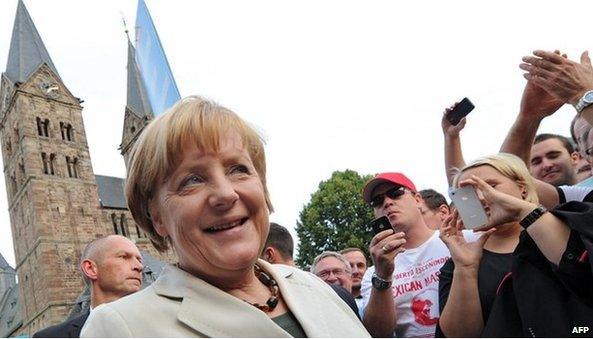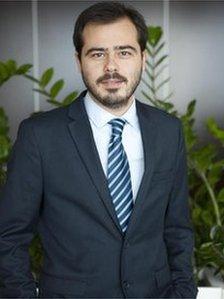More or less Merkel? European views on German election
- Published

Germans will go to the polls on Sunday 22 September with Chancellor Angela Merkel looking for a third term in office.
Some credit her with demanding and standing firm on reforms that are vital to Europe's recovery; others say her inflexibility is breaking the back of other eurozone economies, and condemning millions of people to poverty.
Her main challenger, Social Democrat Peer Steinbrueck, has called for less austerity and more solidarity with European countries.
Here, readers give their opinions - does Europe need more or less of Mrs Merkel?
Antoine Jenart, Brussels, Belgium
'Chancellor Angela Merkel is a professional'
I believe that Angela Merkel, with her outstanding political strengths and in a certain sense political charm, can help Europe thrive.
A relevant question to [Mrs] Merkel's European opponents might be, if Angela Merkel goes, will the second strongest German political party, SPD, provide any better solutions to the current European crisis?
I firmly believe that what we currently need in Europe are people who know how to handle politics, and who have experience. Chancellor Angela Merkel is a professional.
In contrast [Mr] Steinbrueck would need to learn on the job - something we cannot afford at the moment as we need to act and swiftly.
Given the strong economic figures and the way [Mrs] Merkel's government managed the crisis, there is no obvious reason for Germans to demand a radical change by voting for [Mr] Steinbrueck.
Elina Ermsone, Riga, Latvia
I believe that Chancellor Merkel has made some difficult, but necessary decisions.
She has withstood the pressure, maintained a clear direction and provided the right kind of leadership during these difficult times.
I think that her government is the best choice for the German nation as well as the European Union.
During the financial crisis Chancellor Merkel provided the right direction for the European Union - convincing the stronger economies to contribute to the support of the weaker countries.
[The] European Union consists of a set of very diverse nations, which can make cooperation difficult, but [Mrs] Merkel has made admirable and successful efforts to bring the European countries together.
Some of her measures are conceived as unfair and harsh, but in these circumstances it is necessary to impose certain restrictions on some countries to help them regain economic health and avoid posing a tremendous burden on other economies.
Loizos Pavlides, Athens, Greece

"If she is re-elected, it will mean further pain and ruin for southern Europe"
I have been unemployed since 2011, and it's impossible to find work nowadays.
Greece's national debt is the same today as it was when the crisis started. For all this, [Mrs] Merkel shares a large part of the blame.
[Mrs] Merkel has clearly shown that she does not care how much suffering her austerity causes to the afflicted populations. If she is re-elected, it will only mean further pain and ruin for southern Europe.
Not that I expect her opponents to be much better in their treatment of their vassals, but at least they might not torture us with austerity quite so overtly.
Unlike the demonising image of the lazy, tax-evading Greeks that's popular with the Western media, I have always paid my taxes and worked hard. Yet now I am punished by the measures imposed on our government by Germany.
Taxes are so high that [it's] almost impossible to pay them and still have money to live on with dignity. And the worst thing is that we all know these punishing taxes are not used to help Greece, but only to pay interest payments to Germany.
Austerity is simply lunacy. You can't destroy a nation's economy by creating thousands of unemployed workers and expect this nation to recover and at the same time repay punishing interest rates.
We are being gradually enslaved, and I hold no hope for the future.
Mihnea Anastasiu, Bucharest, Romania

"I hope she will make some concessions to the left"
Angela Merkel is favourite to remain in the chancellor's seat after 22 September.
However, I hope that she will make some concessions to the left and maybe agree to push down further on the stimulus pedal.
Romania was one of the countries that had to take an IMF [International Monetary Fund], EU and World Bank loan back in 2009 in order to bridge a public-finances funding gap, and prevent a depreciation of the local currency coupled with a flight of foreign capital.
Romania had to comply with strict targets in reducing public deficits. This meant a hike in the VAT rate and a temporary wage cut of public employees.
Such measures prolonged the recession in Romania, and Germany was one of the main proponents of such budgetary consolidation policies on an EU-wide level.
Yet, Germany is also Romania's main trading partner and one of the most important foreign investors in the country.
The growth of the German economy stimulated Romanian exports, and temporary German government policies such as the buy-back programme for cars led to a sharp increase in Romanian automotive industry export output.
Ploutarhos Pantelides, Limassol, Cyprus

"If she stays in power, she will deal the killer blow to the EU"
[Mrs] Merkel has managed to make the EU increasingly dependent on Germany, using the EU political mechanisms, especially the common currency.
Now that the south's economy is collapsing, Germany is making profit thanks to its "good pupil" image on international markets, even though it was exactly these southern economies that were the receiving markets of German products - a win-win for Germany.
Now that it's strong enough to stand alone, I believe it will be [Mrs] Merkel who will put an end to the euro as we know it, probably by adopting a German euro.
[Mrs] Merkel is pushing EU countries to their limits - austerity measures are increasingly pushing nations into poverty and despair and in a spiral of recession.
All the while, the German economy is benefiting from the economic downturn of other EU member states.
[Mrs] Merkel is building a strong Germany. If she stays in power, she will deal the killer blow to the EU.
Joachim Abela, Mgarr, Malta
If I were a German, I would vote for Mrs Merkel time and time again.
She is right in pressing for reform and austerity across Europe. We can never afford to become complacent or spend as if there's no tomorrow.
The political class of Greece, Portugal, Spain and others have for a very long time failed their people by failing to reform their systems and [spending] more than they could afford for the sake of political expediency.
The people of these countries are as hardworking as the people of any other country and they deserve better. Mrs Merkel is right in pressing their governments to provide better management and financial structures for their people.
I'm pained to see the hardship that the peoples of fellow Mediterranean countries are going through. Thankfully, my country, also a eurozone member, is not suffering the same fate.
But I sincerely believe that after a period of reform and austerity, as Mrs Merkel is advocating, Europe will emerge stronger.
Produced by Andree Massiah & Victoria Park